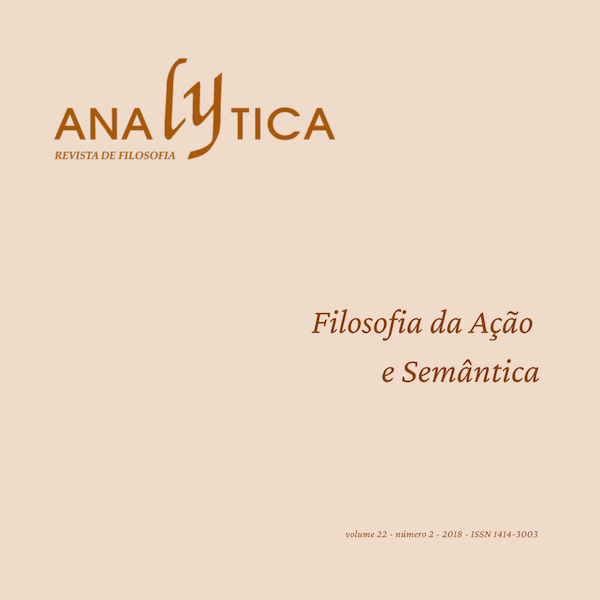O conceito hegeliano de ‘correção’ e suas relações com o conceito hegeliano de ‘verdade’
DOI:
https://doi.org/10.35920/arf.v23i1.43429Palavras-chave:
Verdade, Correção, Idealismo Alemão, HegelResumo
RESUMO:
É notório que, em sua discussão da questão da verdade, Hegel distingue dois termos técnicos, correção (Richtigkeit) e verdade (Wahrheit). É notório também que, entre os dois conceitos, Hegel considera o conceito de verdade como aquele filosoficamente mais relevante. Por este motivo, diferentemente do conceito de verdade, tem sido objeto de
debate se Hegel teria considerado o conceito de correção como possuindo alguma função teórica positiva no contexto do seu pensamento maduro. Neste artigo defenderei a tese segundo a qual Hegel teria formulado uma série de reflexões coerentes acerca do conceito de correção que resultam relevantes no contexto do seu pensamento maduro, mesmo concedendo que tais reflexões não tenham sido desenvolvidas na forma de uma
teoria explícita, autônoma e separada da teoria da verdade. O meu objetivo é tentar resgatar a significação positiva das considerações hegelianas acerca da correção sem superestimar seu alcance e seu estatuto teórico.
Abstract:
It is known that, in his discussion of the question about truth, Hegel distinguishes between two technical terms: correctness (Richtigkeit) and truth (Wahrheit). It is also known that Hegel considers the concept of truth as being philosophically more relevant than the concept of correctness. For this reason, scholars have asked themselves whether or not Hegel considered his concept of correctness as having any theoretical value within the context of his mature system. In this paper I will claim that Hegel puts forward a series of coherent views about correctness that
are relevant for his mature thinking, even though he did not develop these views as an explicit, autonomous theory of correctness which is separated from his theory of truth. My aim is to try to highlight the positive meaning of Hegel’s reflections about correctness without overestimating its reach.
Downloads
Referências
ALZNAUER, M. 2015. Hegel’s Theory of Responsibility. Cambridge: Cambridge University Press. DOI: https://doi.org/10.1017/CBO9781139939614
BALDWIN, T. 1991. The Identity Theory of Truth. Mind vol. 100, no. 1, pp. 35-52. DOI: https://doi.org/10.1093/mind/C.397.35
BORDIGNON, M. 2019. Hegel: A Dialetheist? Truth and Contradiction in Hegel’s Logic. Hegel-Bulletin vol. 40, no. 2, pp. 198-214. DOI: https://doi.org/10.1017/hgl.2017.15
CANDLISH, S. 1999a. Identifying the Identity Theory of Truth. Proceedings of the Aristotelian Society vol. 99 no. 2, pp. 233-240. DOI: https://doi.org/10.1111/1467-9264.00057
CANDLISH, S. 1999b. A Prolegomenon to an Identity Theory of Truth. Philosophy vol 74, no. 288, pp. 199-220. DOI: https://doi.org/10.1017/s0031819199000261
DeVRIES, W. 1988. Hegel’s Theory of Mental Activity. Ithaca/Londres: Cornell University Press.
DODD, J. 2008. An Identity Theory of Truth. Nova York: Palgrave Macmillan. DOI: https://doi.org/10.1007/978-1-349-62870-4
FERRARIN, A. 2001. Hegel and Aristotle. Cambridge: Cambridge University Press. DOI: https://doi.org/10.1017/cbo9780511498107
FERRARIN, A. 2016. Ragione. In: ILLETTERATI, L., e GIUSPOLI, P. (orgs.), Filosofia classica tedesca: le parole chiave. Roma: Carocci, pp. 21-39.
GIUSPOLI, P. 2015. Realismo e anti-realismo em Hegel. Revista Eletrônica Estudos Hegelianos vol. 12, no. 19, pp. 154-176.
HALBIG, C. 2002. Objektives Denken. Erkenntnistheorie und Philosophy of Mind in Hegels System. Stuttgart-Bad Cannstatt: Frommann-Holzboog.
HALBIG, C. 2007. Pensieri oggettivi. Verifiche vol. 36, no. 1-4, pp. 33-60.
HALBIG, C.; QUANTE, M.; SIEP, L. 2001. Direkter Realismus. Bemerkungen zur Aufhebung des alltäglichen Realismus bei Hegel. In: SCHUMACHER, R. (org.). Idealismus als Theorie der Repräsentation? Paderborn: Mentis Verlag, pp. 147-163
HORNSBY, J. (1997). The Presidential Address: Truth: The Identity Theory. Proceedings of the Aristotelian Society vol. 97, no. 1, pp. 1-24. DOI: https://doi.org/10.1111/1467- 9264.00001
HÖSLE, V. 2011. What Can We Learn from Hegel’s Objective-Idealist Theory of the Concept that Goes Beyond the Theories of Sellars, McDowell, and Brandom? In: LIMNATIS, G. (org.) The Dimensions of Hegel’s Dialectics. Londres/Nova York:
Continuum, pp. 216-236.
ILLETTERATI, L.; GIUSPOLI, P.; MENDOLA, G. 2010. Hegel. Roma: Carocci.
KNAPPIK, F. 2016. Hegel’s Essentialism. Natural Kinds and the Metaphysics of Explanation in Hegel's Theory of ‘the Concept’. European Journal of Philosophy vol. 24, no. 4, pp. 760–787. DOI: https://doi.org/10.1111/ejop.12129
LEVEY, B. 2008. Truth, Identity, and Correspondence in Hegel’s Critique of Judgment. International Philosophical Quarterly vol. 48, no. 4, pp. 425-436. DOI: https://doi.org/10.5840/ipq200848462
McDOWELL, J. 2005. The True Modesty of an Identity Conception of Truth: A Note in Response to Pascal Engel (2001). International Journal of Philosophical Studies vol. 13, no. 1, pp. 83-88. DOI: https://doi.org/10.108/0967255042000324353
MIOLLI, G. 2016. Il pensiero della cosa. Trento: Verifiche.
ORSINI, F. 2016. O conceito hegeliano de experiência filosófica. Revista Eletrônica Estudos Hegelianos vol. 13, no. 22, pp. 31-68.
QUANTE, M. 1993. Hegels Begriff der Handlung. Stuttgart-Bad-Canstatt: Frommann- Holzboog.
QUANTE, M. 2011. Die Wirklichkeit des Geistes. Studien zu Hegel.Frankfurt am Main: Suhrkamp.
SORESI, S. 2007. Denken, Nachdenken e objektiver Gedanke nella filosofia di Hegel. Verifiche vol. 36, no. 1-4, pp. 61-91.
SORESI, S. 2010. Normatività, spirito, libertà. A partire da Hegel. Verifiche vol. 39 no. 1-4, pp. 187-213.
STERN, R. 1990. Hegel, Kant, and the Structure of the Object. Londres/Nova York: Routdledge. DOI: https://doi.org/10.4324/9780203006542
STERN, R. 2009. Hegelian Metaphysics. Oxford: Oxford University Press.
Downloads
Publicado
Como Citar
Edição
Seção
Licença
Os autores que publicam nesta revista concordam com os seguintes termos:
- Os autores mantêm os direitos autorais e concedem à revista o direito de primeira publicação, com o trabalho simultaneamente licenciado sob a Licença Creative Commons Atribuição-SemDerivações 4.0 Internacional (CC BY-ND 4.0), que permite a redistribuição, comercial ou não comercial, desde que a obra original não seja modificada e que seja atribuído o crédito ao autor.
- Os autores têm autorização para assumir contratos adicionais separadamente para distribuição não-exclusiva da versão do trabalho publicada nesta revista (ex.: publicar em repositório institucional ou como capítulo de livro), com reconhecimento de autoria e publicação inicial nesta revista.
- Os autores têm permissão e são estimulados a publicar e distribuir seu trabalho online (ex.: em repositórios institucionais ou na sua página pessoal) a qualquer ponto antes ou durante o processo editorial, já que isso pode gerar alterações produtivas, bem como aumentar o impacto e a citação do trabalho publicado (Veja O Efeito do Acesso Livre).






